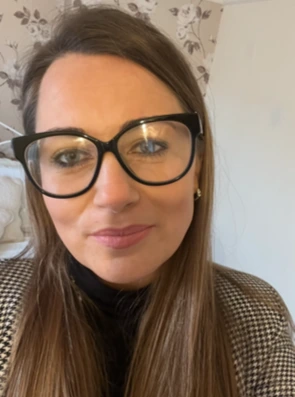

Kaylee is a person-centred counselling therapist with a deep interest in how our surroundings shape wellbeing. Based in Essex and Suffolk, she chose to study MSc Psychology: Environment, Health and Wellbeing at the University of Cumbria to explore the wider context of mental health, from nature and green spaces to social and environmental factors. Here, she shares how the course has supported her professional growth, enriched her therapeutic practice, and inspired new research directions.
Tell us about yourself, and what led you to study for your MSc in Environment, Health and Wellbeing?
I’ve always been drawn to working with people and supporting them through difficult times, which is why I trained as a person-centred counselling therapist in psychotherapy. I qualified a couple of years ago and am currently in the process of becoming accredited with the BACP. Once I complete my Master’s, I’ll be working towards senior accreditation. You can find me on LinkedIn, where I share updates about my work and professional journey here.
Over time, I began noticing how much people’s wellbeing is shaped not just by what’s happening inside, but also by their surroundings, whether that’s their family, their work, or even access to nature. That curiosity grew, and I realised I wanted to explore more deeply how health, wellbeing, and the environment all connect. The MSc felt like the right next step for me. It allowed me to build on my therapy work while also widening my perspective, so I could better understand the bigger picture of what helps people feel well and supported.
Being based in Essex and Suffolk and working remotely, the online format suited me perfectly, allowing me to study without being tied to Cumbria. It was flexible around my client work and daily routine, which made it both manageable and enjoyable.
Can you tell us about your experiences on the course?
The course has been challenging but also incredibly rewarding. I’ve learned so much, from understanding research methods to exploring how different environments can affect health. I’ve particularly enjoyed reading qualitative research, as it provides a more rounded picture of individuals’ lived experiences. I also explored topics such as environmental concern, supporting sustainability, and the role of green spaces in wellbeing, which strengthened my eco-credentials and professional focus.
The course has also helped me grow personally. I’ve become better at organising myself, managing projects alongside work, and staying motivated when things felt tough. It has pushed me to improve my communication, too, whether through writing, presentations, reflective practice, or sharing ideas with others. Reflective practice has been especially valuable, helping me think critically about my own work and continually refine how I approach both study and practice.
I’ve found the ethical side of research particularly important, thinking carefully about how people are treated in studies and ensuring their voices are respected. This connected strongly with my counselling values, and I also developed awareness around issues like data security, privacy, dignity, accessibility, and inclusion. Along the way, I gained confidence using research software and digital tools to manage data and analyse findings.
In my negotiated learning module, I focused on how environmental and social factors influence the wellbeing of adults living with Tourette’s, which deepened my understanding of an area I hope to focus on more in the future.
What are you most proud of? Are there any achievements that stand out to you?
I’m proud that I managed to balance my studies with work and family life. That feels like an achievement in itself. Through the course, I developed project planning skills, mapping timelines, setting goals, and prioritising key tasks to keep everything on track. The support of my tutors and supervisors made this possible, and I’m truly grateful for their guidance.
My dissertation explored how the colours associated with the seasons impact people’s wellbeing. This was qualitative research using semi-structured interviews, and I loved every part of it. I had the opportunity to interview participants, drawing on my counselling skills to ask open questions, use prompts sensitively, keep the duration manageable, and provide proper debriefing afterwards.
I’ve been especially proud of projects where I’ve been able to talk to people and gather their experiences. Listening to their stories reminded me why I chose this path in the first place. My counselling background really supported me here, as I felt confident in creating a safe and open space for people to share.
I’m also proud of simply sticking with the course and seeing how much I’ve grown with each assignment. At times it was difficult, but completing work that felt meaningful gave me a real sense of accomplishment. I particularly valued focusing on areas that mattered to me, such as my work with children and young people and the environments they live in, which made the learning feel directly relevant and rewarding.
What are your plans for the future? What would you like to do next?
Looking ahead, I’d like to continue developing my research skills, especially exploring people’s lived experiences. I am currently training to work with severe depression, as I believe there is so much to be gained from truly listening and understanding people’s experiences. I’d also like to keep combining my therapy work with what I’ve learned from the MSc, so I can offer support that considers the wider context of someone’s life.
On a personal level, I want to keep living in line with my values of compassion, equality, and kindness. I love spending time with my family and, even more so now, being outdoors. I’d like my work to carry that same sense of connection and joy. The course has inspired me to enjoy the outside world more with my family. We used to take our local area for granted, but now we make a conscious effort to appreciate it and connect with it regularly.
